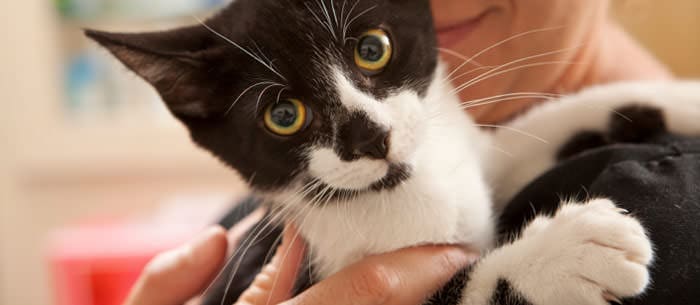Cats are known for being particular. They clean their fur just so, fastidiously cover up their business in the litter box, and some — like my petite princess of a grey tabby — love nothing more than prancing around so you can see how beautiful they are. But your cat can’t take care of herself all on her own. Here are some tips for keeping her happy, healthy, and looking fabulous.
Healthy Body Weight
Cats may not be obsessed with their weight like humans are, but it is something for you to pay attention to. Talk to your vet about a healthy weight for your cat. If your cat is too skinny, this could indicate hidden health problems. On the other hand, a chubby kitty — while cute and cuddly — is not a healthy kitty. Just like in people, excess fat can cause health problems in your cat. Helping your cat to maintain a healthy weight will keep her healthier and help her to live longer.
Fur and Skin
- Brushing
Unless your cat is a hairless breed, brush her daily to remove excess fur and cut down on hairballs. A healthy coat will look shiny and smooth, with no bare patches. If you notice any lumps or sore spots as you brush your cat, talk to your vet.
- Shaving
But what do you do if your cat hates to brushed? Unlike my petite princess, my other cat, a 16-pound bruiser with the most beautiful long hair, can’t stand to be groomed. As a result, he ends up with mats and tangles. So every six to nine months, I take him to the groomer and get him shaved. He ends up looking a little funny, but he seems to love it. Afterwards he’s more playful and affectionate. If your cat is anti-brush, ask your vet if a trip to the salon might be in order.
- Fleas
If your cat is hosting a tiny flea circus, chances are you won’t see the culprits themselves. But you may notice your cat scratching or biting at her fur a lot. Check her regularly for flea dirt, which is a nice way of saying flea poop. It looks like specks of black pepper and is actually dried blood. If you notice this, make a vet appointment.
Gums and Teeth
I confess that before I became a cat owner, I had no idea that cats need help with dental hygiene. Your vet should check your cat’s teeth and gums at every visit. You should also check these regularly. Her gums should be pink, and her teeth should be white and free of cracks. Plaque and tartar buildup can turn teeth yellow or brown. Dental treats can help to reduce this residue. If the buildup gets too bad, your vet should discuss the option of doing a clinical cleaning. And while your cat’s breath probably won’t be minty fresh, see the vet if you notice a new or funky odor, as this can be a sign of infection.
Eyes
Being “bright-eyed and bushy-tailed” applies to cats. Well, at least the bright-eyed part. Your cat’s eyes should be bright and focused. And while a few crusties in the corners is normal, there shouldn’t be any excessive discharge.
Ears
Check your cat’s ears regularly. If you notice a bad smell or see a lot of wax or black gunk, she may have ear mites or an infection. What to do? Take her to the vet, of course.
Nose
Don’t worry if you notice that your cat’s nose is warm and dry instead of cold and wet. It’s a myth that this means she’s sick.
Claws
Cats are natural-born scratchers. (Natural-born killers, too, but that’s a different issue.) They use scratching to mark their territory, as a form of exercise, and as a way to shed the outer layers of their claws.
If your cat is not declawed, think twice before scheduling this operation. Many people consider declawing cruel, and it’s even outlawed in some European countries. The procedure amputates the last bone of each toe, which is the equivalent of cutting off a person’s finger at the last knuckle. The recovery process is quite painful and can even cause long-term health issues and numerous behavior problems.
Instead of declawing, give your cat a good place to scratch. Use positive reinforcement to teach her to use a scratching post. If she develops a penchant for your favorite couch, try spraying it (the couch, not the cat) with bitter apple spray or placing double-sided sticky tape, plastic or aluminum foil on the furniture to deter her.
Healthy Mind and Spirit
Your cat needs you as much as you need her. Sure, she may not always show it, but I bet she lets you know when it’s time to play or cuddle. Spend time playing with and petting your cat everyday.
Cats can get bored, especially if they spend all of their time indoors. (Nonetheless, keeping your cat inside is a good idea, as those who roam outside have shorter life spans.) Rotate your stock of cat toys and include a few that she can play with when you’re not around. But be careful not to leave things like string or ribbon lying about, as cats may try to eat these and end up needing an emergency vet visit.
Lots of things need routine maintenance: cars, air conditioners and, yes, cats. Use the checklist above to give your cat a monthly inspection. (At least you don’t have to change her oil every 3,000 meows!)
Jennifer McGuiggan writes about pet care for Care.com and other publications. She has two cats and writes about them on her blog at thewordcellar.blogspot.com.
More Resources for Cats
Need someone to watch your cat while you’re away? Search our selection of cat sitters to find the one right for you and your feline friend!



